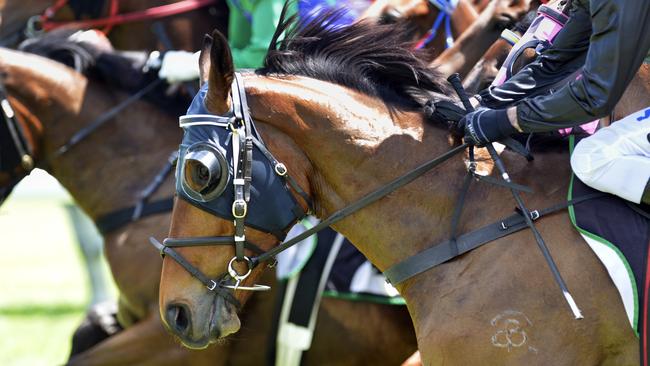TRNT appeals committee finds drug testing ‘anomaly’ an ‘unsafe embarrassment’ to NT horse racing
Thoroughbred Racing NT chairman of stewards David Hensler said it was ‘a matter of interpretation as to whether farriers are covered when it comes to drug testing’.

Northern Territory
Don't miss out on the headlines from Northern Territory. Followed categories will be added to My News.
The Thoroughbred Racing NT Appeals Committee has called out what it says is an “apparent anomaly” that sees farriers exempt from oversight for drug use as “unsafe and an embarrassment” to the Territory’s racing industry.
In a judgement handed down last year, committee chairman Pat McIntyre and member Syd Stirling found stewards did not have the authority to drug test racing farriers as they were not required to be licensed in the NT.
“In the opinion of this appeals committee, the fact that racing farriers remain unregulated and outside the ambit of the oversight of the stewards is unsafe and an embarrassment to the local racing industry,” they wrote.
“This appeals committee strongly recommends that a regime of licensing of (at least) racing farriers be implemented in the Northern Territory as a matter of urgency.”
In response TRNT chairman of stewards David Hensler said he believed farriers were “covered under the Australian Rules of Racing” which apply across all jurisdictions.
Those rules define a “horse handler” as “any licensed person who handles any horse at any race meeting, trial, jump-out or in training”, including farriers.
“That definition allows the stewards to have power over farriers because they’re particularly listed in that rule,” he said.
“The chairman was of the view that, well, if it’s not in our local (NT Rules of Racing), they need to be covered, but looking at the Australian rules, they are covered in that.”
But Mr Hensler said he would seek clarification with Racing Australia at the next national meeting, expected to take place in the first half of this year.
“The matter that I’ve raised with our chairmen of stewards conference … will be whether, the word ‘licence’ being in that definition of horse handler, whether that actually includes farriers, veterinarians and barrier attendants,” he said.
In its judgement, the appeals committee noted as “significant that the horse racing industry requires farriers to be licensed in all Australian states” and they had been “regulated in India since 1965”.
But Mr Hensler said there were a number of other Australian jurisdictions that also did not require farriers to be licensed.
“The licensing of farriers is not done in the NT, there’s no mechanism to do that, they don’t do that in a lot of other states either,” he said.
“It’s a matter of interpretation as to whether farriers are covered when it comes to drug testing.”
It comes after farrier Mathew Penney had his track rider’s licence disqualified for three months after returning a “high range” result for cannabis from a drug test at the Alice Springs Turf Club last year.
Track rider suspended after ‘high range’ cannabis test result
An Alice Springs track rider who took the saddle while under the influence of cannabis because he “didn’t think I was going to get tested” has lost an appeal against a three-month ban.
Mathew Penney was disqualified from track riding for three months in March last year after testing positive for the banned substance at the Alice Springs Turf Club the previous month.
Mr Penney appealed the stewards’ decision to Thoroughbred Racing NT’s Appeals Committee arguing the penalty was too harsh, the committee’s published decision reveals.
Mr Penney submitted that the “high range” reading was consistent with his having ingested the drug the Friday prior to testing positive on Monday and the disqualification “harms his personal relationships”.
He also claimed he would lose his ability to earn a living as it was “not realistic” for him to find work as a farrier in Alice Springs outside the racing industry and the loss of his services would cause hardship to owners and trainers due to the scarcity of other farriers.
In response, Chairman of Stewards David Hensler argued the time that Mr Penney ingested the substance was “not relevant to either the conviction or the penalty”.
“Whether doing trackwork, working as a stable hand or doing farrier work in the racing industry, anybody having such a high concentration of a banned substance in his system as did the appellant would have constituted a dangerous risk to the safety of the public and participants involved in the horse racing industry (including the horses),” he submitted.
“The appellant undertook trackwork on the Monday knowing that the banned substance ingested by him on the previous Friday would still be in his system.
“When asked why he had nevertheless ridden, the appellant replied ‘I didn’t think I was going to get tested’.”
In siding with the stewards, the committee found “the date of ingestion is irrelevant”.
“There is no evidence that the stewards drew an adverse inference against the appellant regarding the date of ingestion,” the decision reads.
“The transcript simply reveals an observation by Mr Hensler to the effect that the reading seemed to him to be high on the Monday if the relevant ingestion had been on the previous Friday.”
The committee also found the stewards had not failed to take into account the “serious impact” the penalty would have on Mr Penney.
“It is not some ‘unrealistic’ assumption by the stewards that has interrupted the appellant’s source of income in the horse racing industry but rather his conscious decision to ignore the rules that regulate this complex industry to promote safety for the public and the participants,” the decision reads.





